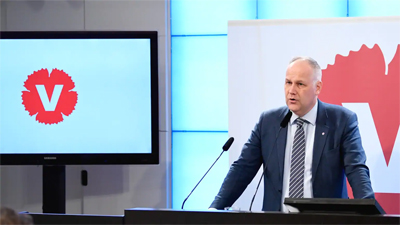
pic: miljöpartiet.se
The Green party is in crisis discussions regarding staying or leaving the government, Expressen reported today. By the end of August, the government wants to have a new migration policy, one that has broad support from all the parties, done and dusted. To this end, the Social Democrats have had long and intensive discussions with the Moderate party in particular, something the Green party doesn’t appreciate at all as they and the Moderates have largely diametrical thoughts on the immigration topic. Last Friday, the discussions were particularly comprehensive – but the Green party was left out on the doorstep.
At the moment, the Social Democrats, the Moderates and the Christian Democrats are agreed, DN reports, on some sort of asylum “max number”. Even the Center party and Liberals haven’t expressed outright opposition to the concept. These three or more parties, if they come to an agreement, would get a majority in parliament. The Sweden Democrats would likely go along though, which would make a pretty much unassailable majority, even if they say they consider the proposal “way too lame” (alldeles för mesigt).
On the other hand, however, the Green party and the Left party are indignant going on outraged. “The Social Democrats are slamming the door in both our faces by negotiating with the Moderates. There is another majority here, one that the government is actually based on. Still, they turn to the Moderates. It’s refugees who will pay the price” said Left party board member Christina Höj Larsen. “It is completely unique that the government negotiates with the opposition and not its own partner” said a Green party member to Expressen. “Are all the questions we’re not agreed on to be decided with the Moderates in the future?”
When the Social Democrats first put more restrictive policies in place after the wave of immigration threatened municipality stability back in 2015, the Green party still didn’t leave the government – to the dismay and anger from a large part of their following. They will be risking that anger again if their “partner” the Social Democrats run them over again on the same question.
One thing that might make a more restrictive immigration policy more palatable, however, is if the government says no to Preem’s expansion plan (see “Preem gets a pass” here). If not, though, losing on two issues close to their heart, if that’s what happens – and when they’re supposed to be a deciding partner – might prove to be too much to swallow.







